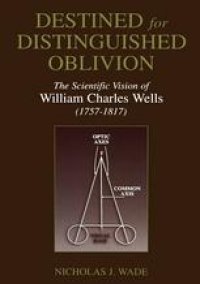
Ebook: Destined for Distinguished Oblivion: The Scientific Vision of William Charles Wells (1757–1817)
Author: Nicholas J. Wade (auth.)
- Tags: Psychology general, Health Psychology, Neuropsychology
- Series: History and Philosophy of Psychology
- Year: 2003
- Publisher: Springer US
- Edition: 1
- Language: English
- pdf
My fIrst encounter with the name of William Charles Wells, over twenty years ago, was an oblique reference to his Essay upon single vision that Wheatstone (1838) made in a classical article on binocular vision. The reference was enigmatic because it stated that few had paid attention to Wells' theory of visual direction, while doing little to infonn the reader of its novelty. I was fortunate in having the excellent facility of the Rare Books and Manuscripts Department of the Library at the University of St. Andrews near at hand, so that I could cousult a copy of Wells' monograph. However, I was not aware of the full import of its contents until Hiroshi Ono visited Dundee from York University, Ontario, in 1980. Hiroshi had previously fonnalised the principles of binocular visual direction that Hering (1879) had proposed. He returned one day from St. Andrews, having read Wells' Essay upon single vision, amazed to have found that Wells had perfonned similar experiments and reached similar conclusions to Hering. Hiroshi Ono has done much to bring Wells' work on binocular single vision to the notice of visual scientists, although its reception has not been without opposition. As I read more of Wells' work on vision I became aware of its breadth as well as its depth. In addition to his essay on binocular single vision, he wrote about and conducted experiments on accommodation, visual acuity, visual persistence, and vertigo.
The emergence of experimental studies of vision can be traced to the adoption of Newtonian methods of observation and experiment, and in their application to space perception by Wells (1792). His initial researches were concerned principally with binocular vision, but he also conducted experimental studies of accommodation, acuity, eye movements, and vertigo. With regard to the last, he entered into a debate with Erasmus Darwin concerning the involvement of eye movements in vertigo. Indeed, Wells should be acknowledged as laying the foundations for modern studies of vestibular function as well as eye movements. The book reprints his Essay on single vision with two eyes (1792) and his own Memoir of his life (1818). Wells also outlined a theory of natural selection before Charles Darwin and provided an account of the formation of dew. His essay on natural selection is reprinted as an Appendix to the book. Wells' experiments and observations on natural phenomena will surprise students of science because of their modernity.